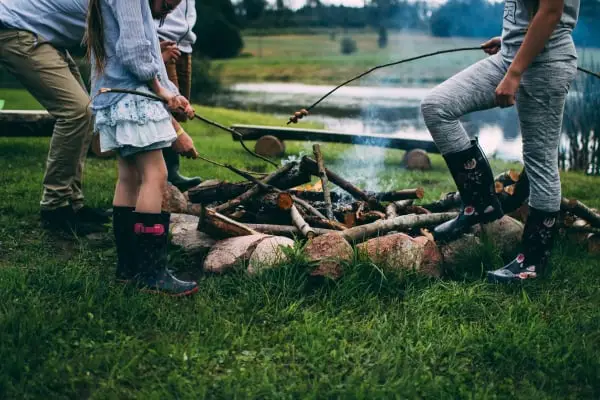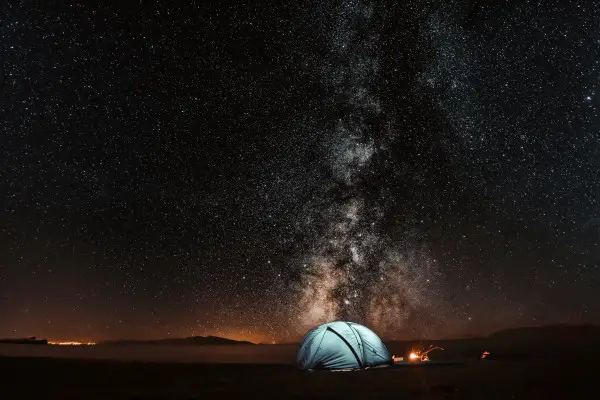
We all know that camping is good for us but is it good for families?
Table of Contents
Here are 10 Reasons Why Camping Is Good For Families:
1. Fresh Air and Sunshine
There isn’t much time to spend in nature with our hectic schedules unless it’s at a playing field for soccer or football.
Of course, the focus isn’t usually on the surrounding plant life, and the air quality is questionable especially if it’s right by a busy street. We all know that indoor air quality is even worse and that’s where we typically spend most of our day.
Camping out in the wilderness gives everyone invigorating, fresh air to breathe and plenty of sunlight to warm the skin and absorb vitamin D.
Exercise is part of the package, too, however, it comes naturally. Just walking to your campsite, setting up the tent, gathering firewood, and exploring your surroundings, keeps everybody moving.
If you’re at a higher altitude, your body has to work harder to expend energy. Once it adjusts, it’s actually good for you. One study found it increased the number of red blood cells the body produces, the positive effects lasting for months after returning to normal altitudes. Regular camping trips mean a healthier family.
2. Restful and Rejuvenating Sleep
When camping, your schedule becomes in tune with nature. Chances are you’ll be exploring, hiking, fishing, swimming, or doing other outdoor activities all day. Later, the body naturally winds down as the sun sets. After a campfire dinner and roasting marshmallows, it’s likely you’ll all feel tired and ready to turn in.
You might think that sleeping in a tent doesn’t promise a good night’s sleep. Surprisingly, the opposite is true. All that daytime playing means the kids will sleep soundly. For you, that means no interruptions to your sleep during the night. You’ll all head for the tent much earlier without all the usual distractions keeping you up into the late hours.
Snuggling close, you’ll feel the light, cool breeze on your cheeks, hear the sound of nature all around you, as well as the soft breaths of your children. It’s hard not to fall into a sweet, deep slumber with those ingredients.

There’s nothing like waking up to rays of sunshine peeking through your tent and the sounds of birds chirping. You’ll feel refreshed in a way you usually don’t.
Also, when you’ve been out in the sun all day, your body is more aligned with the natural circadian rhythms that promote restful sleep. Sound sleep means better moods all around and in this sleep-deprived society that’s a real plus.
3. Team Building Between Family Members
It pains us when we see our kids fighting. We want our family to get along. Though the drive to wherever your camping may be riddled with bad moods and complaints, once you arrive, everything begins to change. That’s because everyone has to pitch in with a job they’re responsible for.
Someone smooths a clearing for the tent. A sibling carries the tent bag and takes out the necessary parts. She hands them to the parent who starts inserting the rods and getting the tent upright.
Working as a team they tackle problems that come up together. Someone else brings the cooking equipment to the picnic table and puts things in the tent. Smaller children are getting creative in the dirt, having a lot more fun than you think discovering bugs.
Gathering sticks for the fire is always a favorite job, especially when you tell them they have to get dry pine needles and leaves, too, to get a stronger fire going in the beginning.
Can aggravating problems emerge? Probably, but you can help everyone find the humor in it and move past it to get the task done.
4. Creates Confidence
Another direct result of all the hands-on work required with camping is the building of confidence. Especially in the tween and teen years, kids need to feel helpful. They want to know that their presence matters and they are contributing to the success of things. Nothing beats seeing your child beam with pride and feeling good about themselves.
You may discover you can do things that you didn’t think you were capable of. Even adults enjoy the boost in self-confidence at their own newfound abilities. It gives everyone a strong sense of accomplishment.
5. Brings Family Members Closer
At first, it may seem the camping trip has caused friction between all of you, but working together with no technology to distance you fosters true bonding. You’re going for a walk or hike and taking in the beautiful surroundings. Even a critic will start to soften when you encounter cute wild animals or maybe the adrenaline-inducing larger ones. That kind of excitement outranks any video game monster.
You might notice your son helping his little sister get past some prickly bushes or lending a hand up a steep part in the trail. By the time you all chip in to make dinner while one of your kids collects the perfect sticks for roasting marshmallows, you’re all talking about the events of the day, focused on the actual environment you’re in, fully present in the live surroundings around you, and each other.
In the cold night air, cuddled up in warm jackets and taking your marshmallow off the stick, you actually look into each other’s eyes. You notice the expressions on your son’s face and realize you haven’t been paying attention lately. A warm glow fills you as you treasure the family you love so much.
In the tent, you tell scary stories and cuddle close. Someone hears a howl and gets scared, while another laughs and enjoys the thrill, but the key is you’re all sharing the same experiences together in a way that’s difficult to do in regular life. Every day, communication gets easier, the bonds you’re developing stronger.
6. Star Gazing the Magnificent Night Sky
It’s incredible seeing the enthusiasm of your child when they experience something for the first time. It’s as if you are, too. You see it again in that fresh, exhilarating way. In fact, it may have been years since you saw so many bright stars as far as the eyes can see decorating the sky with splendor.

The vastness of the cosmos trigger feelings of far-reaching possibility. It stimulates imagination and awe. Rather than feeling small, you sense belonging to something much grander than the stresses of life.
You’re all viewing the celestial bodies and pointing out constellations. Everyone oohs when they see a shooting star, especially if another family member sees the same one. Seeing your kids fully engaged in something that isn’t on a computer screen, now that’s phenomenal!
7. Connecting With Nature and Yourself
Studies have shown that even viewing pictures of nature reduces stress levels, causes more productivity, and improves memory. This is true of people who prefer being indoors and living in cities, too. Poets and scholars alike have reflected on the positive effects of nature. For one, the beauty itself leaves you mesmerized. Majestic mountains and canyons, towering pine trees, gurgling brooks, and winding rivers make you feel connected to life itself.
Nature has a way of keeping you in the present moment. Everything else falls to the wayside. You see yourself as part of something miraculous. Feeling more alive and capable, it can’t help but affect relationships in a positive way.
8. Provides Relief From Everyday Expectations
Venturing into the wilderness takes you away from the constant responsibilities and expectations of society. Everyone benefits from the relief it brings. Instead of constantly comparing yourself to others and keeping up with the Jones’, it’s just you, your family, and what’s around you. You realize that life goes beyond the dictates of society, that there’s worth just in being you, being part of this incredible universe, and spending time with the people you care about most.
For a while, all the other stuff doesn’t matter.
This is therapeutic for older kids, as well. Kids nowadays rarely have time to ‘just be’ and feel whatever is going on inside. There’s a good chance they’ll open up more because of it. This is a benefit of camping you’ll treasure.
9. Opens Up the World
Kids have a harder time realizing that there’s a great big world out there beyond the circle of friends they hang out with, school, and extracurricular activities they’re involved in. These are good things in their life, but their focus is narrow. Their problems seem bigger.
Traveling to a faraway beautiful place they’ve never seen sparks curiosity, questions, and communication. Kids begin to feel a sense of wonder about the world. They see other people living in different places, with different lives, and they know there’s more out there than their own personal experience.
10. Gained Perspective
Though similar to the previous benefit, it goes further. Your family’s experience together gives your children, as well as you, a fresh perspective about yourself, your life, and your relationships with each other.
The deeper bonds, the shared adventure, the appreciation of time spent away from the fast-paced routines, and the technology you thought you couldn’t live without can have a profound impact, individually, and on the family as a whole.
You may find yourself longing for another camping trip and getting online to set up a reservation. But somehow, it feels a little different as you check an email and read a tweet.
Those distractions don’t seem as imperative as they did before. In fact, you put the device down and walk down the hallway, noticing your daughter gazing out the window and then continuing to write in her journal.
Your son is hanging a poster up on the wall you bought on the way down the mountain at a quirky gift shop. You smile and breathe in slowly. You all share a precious secret, one you’ll hold on to and cherish for many years to come.
